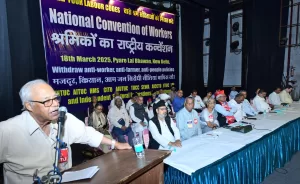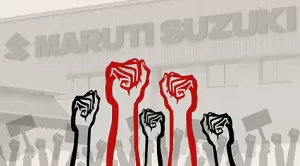Mali, Burkina Faso and Niger Sign Military Alliance
Courtesy: Orinoco Tribune
The military governments of three African states, which all deposed their Western-backed leaders in recent years, have agreed to assist each other, individually or collectively, in case of external aggression or internal threats to their sovereignty.
Mali’s interim president, Assimi Goita, said on Saturday night that he signed the Liptako-Gourma Charter with the leaders of Burkina Faso and Niger, “with the aim of establishing a collective defense and mutual assistance framework.”
“Any attack on the sovereignty and territorial integrity of one or more contracted parties will be considered an aggression against the other parties,” according to the text of the charter, as cited by Reuters.
The charter establishes an Alliance of Sahel States, which comprises three countries that had previously been members of the Paris-supported G5 Sahel pact with Chad and Mauritania, and which has fallen apart following a series of military coups.
The defense minister of Mali, Abdoulaye Diop, explained that this “alliance will be a combination of military and economic efforts between the three countries,” with a focus on the fight against terrorism, particularly in the Liptako-Gourma region, where the borders of the three neighbors meet.
Mali and Burkina Faso previously stated that any attack on Niger would be a “declaration of war” against them as well, after several of Niger’s neighbors from the Economic Community of West African States (ECOWAS) threatened to send troops to restore deposed President Mohamed Bazoum.
Paris was forced to withdraw troops from Mali following tensions with the military government in 2020. Earlier this year, it also pulled out of Burkina Faso after the country’s military rulers ordered them to leave.
Niger’s coup leaders also canceled military agreements that allowed French forces to fight jihadists in the Sahel region, giving the former colonial power only a month to pull out its 1,500 troops. France, however, ignored the ultimatum and demands for its ambassador to leave, as it refused to recognize the authority of the new leadership.
(The Orinoco Tribune is an independent news outlet created in 2018 and specially designed to provide relevant progressive information about Venezuela or related to Venezuela in the form of news articles and opinion pieces for English speakers around the world.)
Is This the End of French Neo-Colonialism in Africa?
Vijay Prashad and Zoe Alexandra
In Bamako, Mali, on September 16, the governments of Burkina Faso, Mali, and Niger created the Alliance of Sahel States (AES). On X, the social media platform formerly known as Twitter, Colonel Assimi Goïta, the head of the transitional government of Mali, wrote that the Liptako-Gourma Charter which created the AES would establish “an architecture of collective defense and mutual assistance for the benefit of our populations.” The hunger for such regional cooperation goes back to the period when France ended its colonial rule. Between 1958 and 1963, Ghana and Guinea were part of the Union of African States, which was to have been the seed for wider pan-African unity. Mali was a member as well between 1961 and 1963.
But, more recently, these three countries—and others in the Sahel region such as Niger—have struggled with common problems, such as the downward sweep of radical Islamic forces unleashed by the 2011 North Atlantic Treaty Organization (NATO) war on Libya. The anger against the French has been so intense that it has provoked at least seven coups in Africa (two in Burkina Faso, two in Mali, one in Guinea, one in Niger, and one in Gabon) and unleashed mass demonstrations from Algeria to the Congo and most recently in Benin. The depth of frustration with France is such that its troops have been ejected from the Sahel, Mali demoted French from its official language status, and France’s ambassador in Niger (Sylvain Itté) was effectively held “hostage”—as French President Emmanuel Macron said—by people deeply upset by French behavior in the region.
Philippe Toyo Noudjenoume, the President of the West Africa Peoples’ Organization, explained the basis of this cascading anti-French sentiment in the region. French colonialism, he said, “has remained in place since 1960.” France holds the revenues of its former colonies in the Banque de France in Paris. The French policy—known as Françafrique—included the presence of French military bases from Djibouti to Senegal, from Côte d’Ivoire to Gabon. “Of all the former colonial powers in Africa,” Noudjenoume told us, “it is France that has intervened militarily at least sixty times to overthrow governments, such as [that of] Modibo Keïta in Mali (1968), or assassinate patriotic leaders, such as Félix-Roland Moumié (1960) and Ernest Ouandié (1971) in Cameroon, Sylvanus Olympio in Togo in 1963, Thomas Sankara in Burkina Faso in 1987 and others.” Between 1997 and 2002, during the presidency of Jacque Chirac, France intervened militarily 33 times on the African continent (by comparison, between 1962 and 1995, France intervened militarily 19 times in African states). France never really suspended its colonial grip or its colonial ambitions.
Breaking the Camel’s Back
Two events in the past decade “broke the camel’s back,” Noudjenoume said: the NATO war in Libya, led by France, in March 2011, and the French intervention to remove Koudou Gbagbo Laurent from the presidency of Côte d’Ivoire in April 2011. “For years,” he said, “these events have forced a strong anti-French sentiment, particularly among young people. It is not just in the Sahel that this feeling has developed but throughout French-speaking Africa. It is true that it is in the Sahel that it is currently expressed most openly. But throughout French-speaking Africa, this feeling is strong.”
Mass protest against the French presence is now evident across the former French colonies in Africa. These civilian protests have not been able to result in straight-forward civilian transitions of power, largely because the political apparatus in these countries had been eroded by long-standing, French-backed kleptocracies (illustrated by the Bongo family, which ruled Gabon from 1967 to 2023, and which leeched the oil wealth of Gabon for their own personal gain; when Omar Bongo died in 2009, French politician Eva Joly said that he ruled on behalf of France and not of his own citizens). Despite the French-backed repression in these countries, trade unions, peasant organizations, and left-wing parties have not been able to drive the upsurge of anti-French patriotism, though they have been able to assert themselves
France intervened militarily in Mali in 2013 to try to control the forces that it had unleashed with NATO’s war in Libya two years previously. These radical Islamist forces captured half of Mali’s territory and then, in 2015, proceeded to assault Burkina Faso. France intervened but then sent the soldiers of the armies of these Sahel countries to die against the radical Islamist forces that it had backed in Libya. This created a great deal of animosity among the soldiers, Noudjenoume told us, and that is why patriotic sections of the soldiers rebelled against the governments and overthrew them.
Anti-Intervention
After the coup in Niger, the West hoped to send in a proxy force—led by the Economic Commission of West African States (ECOWAS)—but the African military leaders demurred. Across the region, people set up solidarity committees to defend the people of Niger from any attack, with the threat provoking “revolt and indignation among the populations,” Noudjenoume explained. Nigerian President Bola Ahmed Tinubu was even forced to back down from ECOWAS’s crusade when his country’s Congress rejected the measure and mass protests occurred against militarily intervening in the neighboring country. As ECOWAS’s ultimatums to restore the deposed Nigerien leader Mohamed Bazoum expired, it became clear that its threat was empty.
Meanwhile, not only did it appear that the people of Niger would resist any military intervention, but Burkina Faso and Mali immediately promised to defend Niger against any such intervention. The new AES is a product of this mutual solidarity.
But the AES is not merely a military or security pact. At the signing ceremony, Mali’s Defense Minister Abdoulaye Diop told journalists, “This alliance will be a combination of military and economic efforts [among]… the three countries.” It will build upon the February 2023 agreement between Burkina Faso, Guinea, and Mali to collaborate on a fuel and electricity exchange, to build transportation networks, to collaborate on mineral resource sales, to build a regional agricultural development project, and to increase intra-Sahel trade. Whether these countries would be able to develop an economic agenda to benefit their peoples—and therefore guarantee that France would have no means to exert its authority over the region—is to be seen.
[Vijay Prashad is an Indian author and historian. He is the director of Tricontinental: Institute for Social Research. He is the author of numerous works, including Washington Bullets (Monthly Review Press. Zoe Alexandra is a journalist and co-editor of Peoples Dispatch. She covers social movements and leftist politics in Latin America and the Caribbean. Courtesy: Globetrotter, a project of Independent Media Institute, a nonprofit organization that educates the public through a diverse array of independent media projects and programs.]




